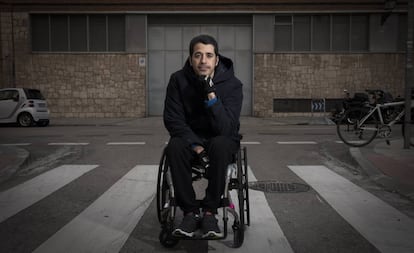Quadriplegic ex-rugby player fights “indecent” insurance payment in Spain
Alberto Aláiz is pushing to increase the meager compensation offered to injured athletes

On October 3, 2015, Alberto Aláiz was left a quadriplegic after being tackled in a rugby match between Atlético and Alcorcón in a Madrid regional competition. He was 39 years old.
I would never be able to look at myself in the mirror again if I hadn’t fought for others Former rugby player Alberto Aláiz
While still in a coma in hospital, a representative from the insurance company told his parents that Aláiz would receive no more than €12,000. His parents refused to sign for the compensation, claiming it was a ridiculously meager amount given the expenses he was about to face just to get by. “That’s just the way it is,” they were told. “This is the amount listed in the Royal Decree that regulates the minimum compensation of Compulsory Sports Insurance.”
“When you begin playing a sport you know there are risks involved,” says Aláiz. “You think you might break a leg or an arm and you join the federation to get insurance, just in case. But you never think something more serious could happen, so you never read the fine print on the policy and damages until it is too late.”
Aláiz divides his time between rehabilitation and fighting to change the law. “I knew it was a battle I had to fight.” At first, the former rugby player launched his battle alone, but he later found support from lawyer María José López. Together they have pushed the Superior Council for Sports (CSD) to recognize its responsibility, appealed to the Ombudsman, and taken their story to sympathetic associations and political parties. And now, two-and-a-half years after Aláiz was condemned to live in a wheelchair, their work is finally reaping some fruits.
In France, a rugby player received €4.5 million when he was left quadriplegic, says Aláiz
On March 21, the Sports and Education Committee of Congress approved a non-binding resolution proposed by the main opposition Spanish Socialist Party (PSOE) to update the damages that are awarded under sports insurance, to improve its coverage and to completely flesh out the existing heath law.
The current Royal Decree states that “it is compulsory for all federated athletes who participate in official state competitions to have insurance that covers the health risks of their corresponding sport.” It was signed in 1993 by then-Science and Education Minister Alfredo Pérez Rubalcaba and set damages for serious injuries, like quadriplegia, at two million pesetas.
Twenty-five years ago this amount may have made sense, but to offer the euro equivalent of €12,000 in 2015 is “indecent,” says Aláiz. Indeed the Royal Decree outlines that this amount should be updated every three years. But since 1993, the only change has been to convert two million pesetas into €12,000.
“My life has changed but I haven’t been able to adapt my house to my quadriplegia, which they say will cost €80,000, or adapt my car or pay for rehabilitation that is not solely for maintenance purposes,” says Aláiz, who is the father of two children. “I wasn’t able to ask for help to buy a wheelchair because the insurance only pays for orthopedic treatment that will cure you, and the insurance company thinks there is no cure for me.” If Aláiz had been hurt in a traffic accident and not on the pitch, he would have received €1.5 million, according to the insurance scale published in the Official State Gazette (BOE).
Membership in the a rugby federation cost Aláiz €183 a year, of which €135 went to his insurance coverage. “But I saw later that for €8 more, protection would have been €120,000. But the federations stick to the minimum and the CSD continues to tell me that if the insurance was higher. the federations wouldn’t be able to afford it.”
According to Aláiz, the situation is very different in other countries. In France, a rugby player received €4.5 million for a similar accident; in Ireland the minimum is €850,000, and in the United Kingdom it is €645,000.
At his last meeting with sports authorities, Aláiz says the current president of CSD told him he has nothing to gain because any changes to the law would not be retroactive. “I told him I wasn’t fighting for myself but so that another person doesn’t suffer what I have been through,” he says. “If someone had done this before me, I would have benefited from it… I would never be able to look at myself in the mirror again if I hadn’t fought for others.”
English version by Melissa Kitson.
Tu suscripción se está usando en otro dispositivo
¿Quieres añadir otro usuario a tu suscripción?
Si continúas leyendo en este dispositivo, no se podrá leer en el otro.
FlechaTu suscripción se está usando en otro dispositivo y solo puedes acceder a EL PAÍS desde un dispositivo a la vez.
Si quieres compartir tu cuenta, cambia tu suscripción a la modalidad Premium, así podrás añadir otro usuario. Cada uno accederá con su propia cuenta de email, lo que os permitirá personalizar vuestra experiencia en EL PAÍS.
¿Tienes una suscripción de empresa? Accede aquí para contratar más cuentas.
En el caso de no saber quién está usando tu cuenta, te recomendamos cambiar tu contraseña aquí.
Si decides continuar compartiendo tu cuenta, este mensaje se mostrará en tu dispositivo y en el de la otra persona que está usando tu cuenta de forma indefinida, afectando a tu experiencia de lectura. Puedes consultar aquí los términos y condiciones de la suscripción digital.









































